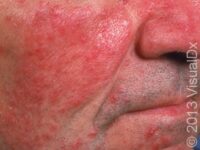Rosacea Tips for Preventing Flare-Ups
Rosacea is a chronic skin condition that affects millions of people worldwide. If you’re one of the millions affected by rosacea, you know how frustrating it can be when you experience a flare-up. Fortunately, there are lifestyle modifications you can make to prevent your next flare. In this article, we present methods to better understand what triggers rosacea and how to prevent your next flare.
Familiarize Yourself with Common Triggers
There are many triggers of rosacea, including food and drinks, skin and hair care products, makeup, exertion, emotion, and your environment. Understanding these triggers is essential to managing your condition.
Some specific dietary and temperature-related triggers include alcohol (especially red wine and beer), spicy foods, cinnamaldehyde-containing foods (tomatoes and chocolate), histamine-rich foods (aged cheese and processed meats), hot beverages, hot baths and showers, and saunas.
Identify and Avoid Your Triggers
Documenting your daily exposures over the course of several weeks can help you identify your rosacea triggers. The “Rosacea Diary,” a tool created by the National Rosacea Foundation, can assist you with this process. By identifying and avoiding your triggers, you can reduce the frequency and severity of your rosacea flare-ups.
Protect Your Skin from the Sun
Ultraviolet (UV) light is known to play a role in rosacea. Therefore, it’s essential to protect your skin from the sun. Sun protection can be achieved with the use of wide-brimmed hats and sunscreens with UVA and UVB protection and an SPF of 30 or above. Physical sunscreens containing zinc oxide or titanium dioxide are recommended over chemical sunscreens, which can be irritating.
Choose the Right Cleanser and Moisturizer
Use skincare formulations that are free of additives and fragrances. Avoid alkaline soaps, which can cause more damage to skin barrier. Instead, use syndet (synthetic detergent) cleansers that mimic the skin’s natural pH. Moisturize your skin with products that contain ingredients like petrolatum and glycerin.
Explore Medical Treatments
In addition to lifestyle modifications, medical treatments are available to help manage rosacea. Topical, oral, and laser therapies are available. Consult with your local dermatologist to explore these treatment options further.
For more information regarding rosacea, please visit the website of the National Rosacea Society (www.rosacea.org) or the American Academy of Dermatology (www.aad.org).
Last modified on August 2nd, 2023 at 9:04 am
